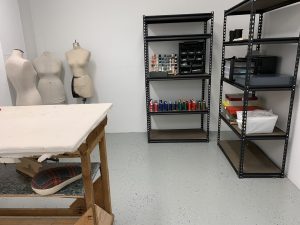Every aspect of life has been impacted by the pandemic, be it working from home or wearing a mask and distancing when in public. The same is true for theatre at Concordia.
“The pandemic has killed most theatre,” said Katie Curry, the Theatre Art department’s costume designer and adjunct instructor.
But theatre at Concordia lives on. There have been necessary changes to this year’s lineup, like changing the number of mainstage shows and choosing a musical with a smaller cast, because “Carousel,” the original pick, wouldn’t have been safe with a cast of 35. Still, the department has found ways to put on performances this year.
Currently, the theatre is rehearsing “Dance Nation,” a hard-hitting coming of age story of 13-year-olds, directed by Reanna Marthaler. Of course, this year, the process looks different than normal. Marthaler explained that this play was chosen last year knowing that the pandemic would make larger and more interactive shows unattainable.
“These shows aren’t written to be performed six feet apart and masked, they’re meant to be ‘normal.’ Reanna, our director, has done a really good job of identifying the changes we needed to make and came up with some very creative solutions,” said Britney Dodge, a junior communication studies and theatre arts major and stage manager for “Dance Nation.”
In rehearsals, everyone is masked and hand sanitizer is used any time a person walks onto the stage or uses shared materials. They also take the temperature of everyone within the room. Staging is a set purposefully so that actors are spaced out and not staying close to one another for extended periods of time.
Changes have been made off the stage as well. Only two student workers are allowed in the costume shop at a time. Each actor has an individual 15-minute time slot where they have the dressing room to themselves, actors do their hair and makeup as best as they can before arriving and quick changes are now done unassisted. Each actor keeps their costume pieces and accessories separate. Clothes that are washable get washed every night, and those that are not get sprayed down with sanitizer and scent eliminators.

It is also the costume shop’s responsibility to create masks that match the costumes so that the actors can have mask changes to fit the scenes, especially since it is a lot harder to convey feelings and passion with half of your face covered.
“Theatre relies so much on nonverbal communication, like facial expressions. Having half off your face covered means this nonverbal communication is often missing,” said Dodge.
To compensate for the lack of facial expressions, Marthaler spends a lot of time during rehearsal working with the actors on their intonation and body language to make the play more accessible for the audience. She makes sure the actors understand what she wants them to portray and gives examples.
At times, masks make it more difficult to hear actors give their lines or hear Marthaler give directions. More than ever, actors need to be very conscious of where the microphones are and make sure that they face towards them and project when speaking.
Even throughout these challenges and shifts, the theatre still remains a passionate, fun and empowering place. It is there that the actors get to have a light environment in these harsh and heavy times. They do not have to lessen their messages and can still push against “norms” of society at large.
“We expect pretty, polite and beautiful, but this show is feral, gruesome and real,” said Dodge. “Our production team is mostly women, femmes and nonbinary students, as is our cast. Because of this, we’re able to decenter the white male gaze we’ve become accustomed to and produce a show where men literally aren’t the main characters.”

